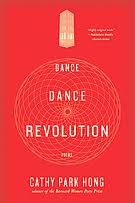
Based upon a central question, 'What happens after the revolution has been televised?' Cathy Park Hong's Dance Dance Revolution came out in 2007, around the same time as my book, On The Other Side Of The Eye. It's not always the easiest text to get into for many students, but I think it's a rewarding venture and what many would call slipstream literature, and which I would say should be considered a volume of speculative poetry.
It's officially described as "The Guide" is a former South Korean dissident and tour guide who speaks a fluid fabricated language; "the Historian" interviews the Guide and annotates the commentaries. Cathy Park Hong's passionate and artful poem sequence weaves an ultimately revitalizing dialogue on shared experience in a globalized world, using language as subversion and disguise."
To me, it has always been hard not to call to mind the Cityspeak of Blade Runner, or the work of Barbara Jane Reyes in her books like Gravities of Center and Poeta en San Francisco, or Umberto Eco's polyglot in The Name of the Rose.
In Publisher's Weekly, it was hailed as: "part poetic sequence, part science fiction: in a future city called the Desert—a Vegas-like manmade tourist trap—a character called the Guide shows another, the Historian, the sights. The Guide has survived the historical Kwangju uprising, a 1980 massacre of students and other prodemocracy protesters by the American-backed South Korean dictatorship. The Guide's speeches—all in verse—turn repeatedly to her own life story, detailed in a superbly invented dialect, based on English but incorporating Spanish and Jamaican patois: "I'mma double migrant," the Guide says. "Ceded from Koryo [Korea], "ceded from/ Merikka." The "Dance Dance Revolution" the Guide has seen—described, vaguely, late (perhaps too late) in the book, and named for, but supposedly unrelated to, the popular video game—thus becomes "Kwangju Replayed," another failed attempt to destroy an undemocratic capitalist system. The Historian's own reflective autobiography, presented in a terse, melodic prose, brings in other examples of global horrors (Sierra Leonean amputees) as it mirrors a reader's own unease. Hong's earlier treatment of Korean-American themes in Translating Mo'um attracted some attention, but nothing could have predicted this admittedly flawed but highly original work: hard to excerpt, hard at times to decode, it's even harder to forget."To me, it has always been hard not to call to mind the Cityspeak of Blade Runner, or the work of Barbara Jane Reyes in her books like Gravities of Center and Poeta en San Francisco, or Umberto Eco's polyglot in The Name of the Rose.
I would agree with much of that assessment.
To me, to enjoy it best, you definitely have to have some familiarity with a number of different languages and cultural practices, but I would also definitely say it could only have emerged from the Asian Americas. The way the language is used, the images you see the narrators focused on, how they process and organize it all. It's definitely a book to examine in studies of both Asian American literature but also speculative literature.
No comments:
Post a Comment